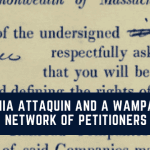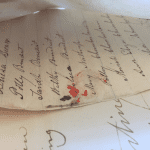The success of Not Even Past is made possible by a remarkable group of writers, both graduate students and faculty. Not Even Past Author Spotlights are designed to celebrate our most prolific authors by bringing all of their published content across the magazine together on a single page. The focus is especially on work published by UT graduate students. In this article, we highlight the extraordinary contributions of Alina Scott who was also Associate Editor and Communications Director of Not Even Past from 2018-20.
Change.org, Ipetition, petitiononline — today, the digital marketplace has spurred the easy distribution of petitions. While they are significant, modern petitioning campaigns offer a different contribution to public discourse than their nineteenth-century counterparts. For women, people of color, and others who had little access to political movers and shakers, petitioning placed them a signature and postage stamp away from the eyes and ears of legislators. Petitions provided grounds to begin a range of other campaigns and simultaneously created a network of canvassers and petitioners.
In 1842, Cynthia Attaquin and 13 other female residents of the Mashpee, a Wampanoag tribe on Cape Cod, petitioned the Massachusetts State Senate to clarify laws regarding the passage of people of color on railroads. Their petition represented a community of color with very specific motivations and understandings about what can come with organized petitioning efforts.
For decades Native American and Indigenous activists have advocated for a move away from Columbus Day. They argue that such commemorations are a reminder of the genocide of Indigenous peoples in the Americas that followed the arrival of Europeans in the region. Because of Indigenous peoples’ activism, legislatures across the US have started to replace the holiday celebrated on October 12th with Indigenous people’s day. This shift is about more than one day of the year. Instead, it encompasses a broader discussion about sovereignty, recognition, and accountability.
The brutal killing of George Floyd by police in Minneapolis this summer marked a key event in the history of violence against Black Americans. But it was just one of many acts of violence that have been committed in American history. In order to put Floyd’s killing into a larger historical context, our Digital History intern, Haley Price, created four ClioVis timelines to help herself and others learn more about such violence. Alina Scott, a graduate student in the History Department at the University of Texas at Austin and Dr. William Jones, a recent Ph.D. from Rice University, also worked on the timelines, adding relevant scholarship to many of the events to assist readers who want to learn more. Below, Haley, Alina, and Will introduce the timeline by telling us how the timelines were compiled, what they learned in making them, and how they think the timelines can serve as a resource for others. While the timelines are not comprehensive, they provide viewers with a sense of the historical forces at play across time and illustrate how the murder of George Floyd in the summer of 2020 fits into a larger pattern of historical violence.
As readers will see, there are four timelines. We originally started making one timeline. But, as the number of events grew, we decided to break the larger timeline into three separate timelines. You now see an “Overview” timeline that includes 153 events. We then divided the overview timeline into three thematic timelines: “Slavery in America,” “Jim Crow to Civil Rights,” and “Police and Civilian Brutality.”
This semester (Fall 2020), Not Even Past announced a collaboration with This is Democracy, a podcast hosted and developed by Dr. Jeremi Suri and his son Zachary. Jeremi Suri holds the Mack Brown Distinguished Chair for Leadership in Global Affairs at the University of Texas at Austin. He is a professor in the University’s Department of History and the Lyndon B. Johnson School of Public Affairs. NEP Associate Editor, Alina I. Scott sat down with the Suris to discuss the origins of This is Democracy, their reasons for selecting guests, and much more.
Read the transcription or listen to the full interview here…
Embedded in the (digital) archive are structures of power. The Native American Petitions Dataverse shifts those structures by attributing authorship to tribal and Native individuals in hundreds of colonial and early American era petitions and memorials. However, is attributing authorship the sole responsibility of those curating digital collections? And even more simply, how does one acknowledge Indigenous authorship in the colonial and early American archive? Jane Anderson addresses this in part by saying “wherein colonialism is understood as a cultural project of control, archives function as the locus for the cultural technology of rule” (234). A “decolonial” project, then, would be would offer counter-narratives to the dominant methods of organizing, the hierarchy of archival sources, and the voices represented in the colonial archive.
Read the full article here.
October 14th is what most people know as Columbus Day. However, for many Indigenous peoples, the celebration of Christopher Columbus is a reminder of the generations of trauma and settler conquest of Native nations and lands. For that reason, several states, including Alaska, Minnesota, Vermont, and South Dakota (and cities like Austin), have chosen to rename the holiday Indigenous Peoples’ Day. Native activists have been at the forefront of this movement….
On Indigenous Peoples’ Day, I’d like to suggest some easy additions to your syllabus, playlists, and bookshelf. This is a brief review of some seemingly untraditional academic works by Native authors, scholars, artists, and creators. My reflection on Native literature here includes scholarship in a number of forms that could easily be incorporated into a syllabus or added to your Comprehensive Exam List. This list is a starting point and I’d encourage readers to go further by listening to Native leaders, scholars, and artists.
On February 21, 1831, a petition containing the signatures of over 800 Connecticut residents was submitted to the United States Congress on behalf of the indigenous population in the South who were facing relocation. The petition acknowledged Native peoples as the “original proprietors of the soil” and its authors claimed that to remain silent would be criminal and cowardly. The petition was not unique, as archivists recognized when organizing it in a folder containing several other petitions with fairly similar appeals. The threat of the forced relocation of Native Americans caught the attention of many activists and benevolent societies in the North as well as the South.
““We do ourselves no good by hiding from the truth,” a Wampanoag elder told David Silverman as he prepared This Land is Their Land. In upward of 400 pages, Silverman suggests that, by “we” the elder was referring to those who would prefer to cling to heartwarming narratives of turkey and peace, rather than grapple with the details of the historical record, and the devastation the “first thanksgiving” left in its wake.”
Read the full review here…
Alina also compiled a number of indexes and lists as Assistant Editor of Not Even Past, including Black Resistance and Resilience: Collected Works From Not Even Past, Gender & Sexuality: Collected Works from Not Even Past, and Resources For Teaching Black History. She has also been featured in Creating a Collective Conversation: A Tribute to Joan Neuberger, The Public Archive, and The Public Archive: Woven Into History.












